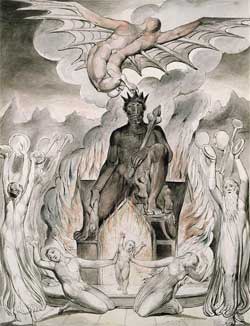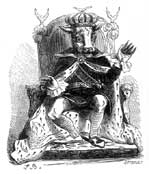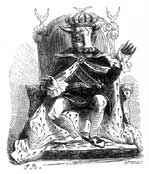Moloch, the Abomination of the Children of Ammon

Molech, whose name probably derived from Melech “king” and Bosheth, “shame”, was one of the deities worshipped by the idolatrous Israelites. He was referred to as “the abomination of the children of Ammon” (1 Kings 11:7) and the primary means of worshiping him appears to be child sacrifice or “to pass through the fire.” Solomon was said to have built a temple to him.
“Then did Solomon build an high place for Chemosh, the abomination of Moab, in the hill that is before Jerusalem, and for Molech, the abomination of the children of Ammon.” (1 Kings 11:7)
Sacrificing children was not uncommon, but the practice died down around the time of Jeremiah when the King defiled Tophet, the place where Moloch was worshiped.
“He also defiled Topheth, which is in the valley of the son of Hinnom, that no man might make his son or his daughter pass through the fire for Molech.” (2 Kings 23:10)
“For the sons of Judah have done that which is evil in My sight,’ declares the LORD, “they have set their detestable things in the house which is called by My name, to defile it. They have built the high places of Topheth, which is in the valley of the son of Hinnom, to burn their sons and their daughters in the fire, which I did not command, and it did not come into My mind. Therefore, behold, days are coming,’ declares the LORD, “when it will no longer be called Topheth, or the valley of the son of Hinnom, but the valley of the Slaughter; for they will bury in Topheth because there is no other place.” (Jer 7: 30-32)
Moloch has often been identified with Milcom, the god of the Ammonites. He was probably also identified with Baal, and as a sun or fire god, as he was also identified with the Assyrian/Babylonian “Malik”, and at Palmyra “Malach-bel”. Moloch is also identified with Baal Hammon in Carthaginian religion.
Moloch in Paradise Lost
Milton writes of him in Paradise Lost
“First, Moloch, horrid King, besmeared with blood
Of human sacrifice, and parents’ tears;
Though, for the noise of drums and timbrels loud,
Their children’s cries unheard that passed through fire
To his grim idol. Him the Ammonite
Worshiped in Rabba and her watery plain,
In Argob and in Basan, to the stream
Of utmost Arnon. Nor content with such
Audacious neighbourhood, the wisest heart
Of Solomon he led by fraud to build
His temple right against the temple of God
On that opprobrious hill, and made his grove
The pleasant valley of Hinnom, Tophet thence
And black Gehenna called, the type of Hell.”
– Paradise Lost, i. 391-405

Dictionnaire Infernal – Collin de Plancy (1863) (paraphrased)
Moloch was the god of the Ammonites, portrayed as a bronze statue with a calf’s head adorned with a royal crown and seated on a throne. His arms were extended to receive the child victims sacrificed to him. Milton wrote that Moloch was a frightening and terrible demon covered with mothers’ tears and children’s blood.
Rabbis claim that in the famous statue of Moloch, there were seven kinds of cabinets. The first was for flour, the second for turtle doves, the third for an ewe, the fourth for a ram, the fifth for a calf, the sixth for a beef, and the seventh for a child. It is because of this, Moloch is associated with Mithras and his seven mysterious gates with seven chambers. When a child was sacrificed to Moloch, a fire was lit inside the statue. The priests would then beat loudly on drums and other objects so that the cries would not be heard.











 Melchom
Melchom